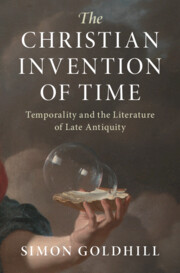Book contents
- The Christian Invention of Time
- Greek Culture in the Roman World
- The Christian Invention of Time
- Copyright page
- Contents
- Acknowledgements
- Abbreviations of Ancient Sources
- Introduction
- Part I
- Chapter 1 God’s Time
- Chapter 2 The Time of Death
- Chapter 3 Telling Time
- Chapter 4 Waiting
- Chapter 5 Time and Time Again
- Chapter 6 Making Time Visible
- Chapter 7 At the Same Time
- Chapter 8 Timelessness and the Now
- Chapter 9 Life-times
- Chapter 10 The Rape of Time
- Part II
- Coda
- Bibliography
- Index Locorum
- Subject Index
Chapter 5 - Time and Time Again
from Part I
Published online by Cambridge University Press: 13 January 2022
- The Christian Invention of Time
- Greek Culture in the Roman World
- The Christian Invention of Time
- Copyright page
- Contents
- Acknowledgements
- Abbreviations of Ancient Sources
- Introduction
- Part I
- Chapter 1 God’s Time
- Chapter 2 The Time of Death
- Chapter 3 Telling Time
- Chapter 4 Waiting
- Chapter 5 Time and Time Again
- Chapter 6 Making Time Visible
- Chapter 7 At the Same Time
- Chapter 8 Timelessness and the Now
- Chapter 9 Life-times
- Chapter 10 The Rape of Time
- Part II
- Coda
- Bibliography
- Index Locorum
- Subject Index
Summary
The discipline of classics is unthinkable without the notion of the exemplary. On the one hand, for centuries in the West, the classical past has provided models of the best in literature, style, political system, sexual freedom – and many other idealisms. The very name ‘classics’ exists because the great texts of the past give us the first, second and third classes by which we classify and evaluate the modern. The lure of classicism is its image of the ideal in the past – a perfection or grandeur or beauty to strive after. The repeated challenges to the privilege of the Greek and Latin past in the education system, the hierarchy of cultural value, or in the very assumption of how the past matters, have sought again and again – often with a self-defeating obsessiveness – to dethrone this position of classics in the tradition of the West. In English, the apparent connection between classics and class has become a byword for such a challenge, insisting on the complicit and corrupting link between social elites and the fantasies of entitled genealogy that ground classicism.
- Type
- Chapter
- Information
- The Christian Invention of TimeTemporality and the Literature of Late Antiquity, pp. 100 - 112Publisher: Cambridge University PressPrint publication year: 2022

